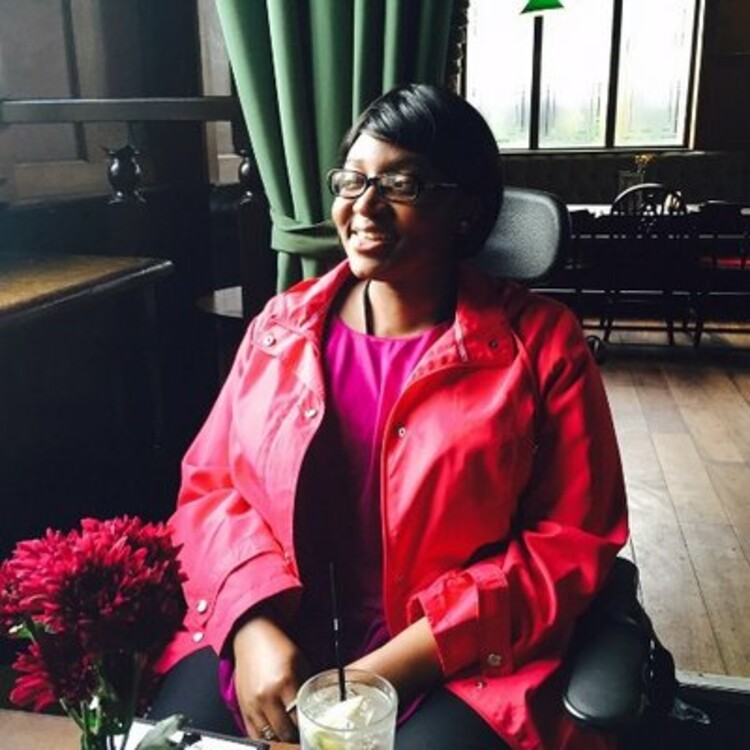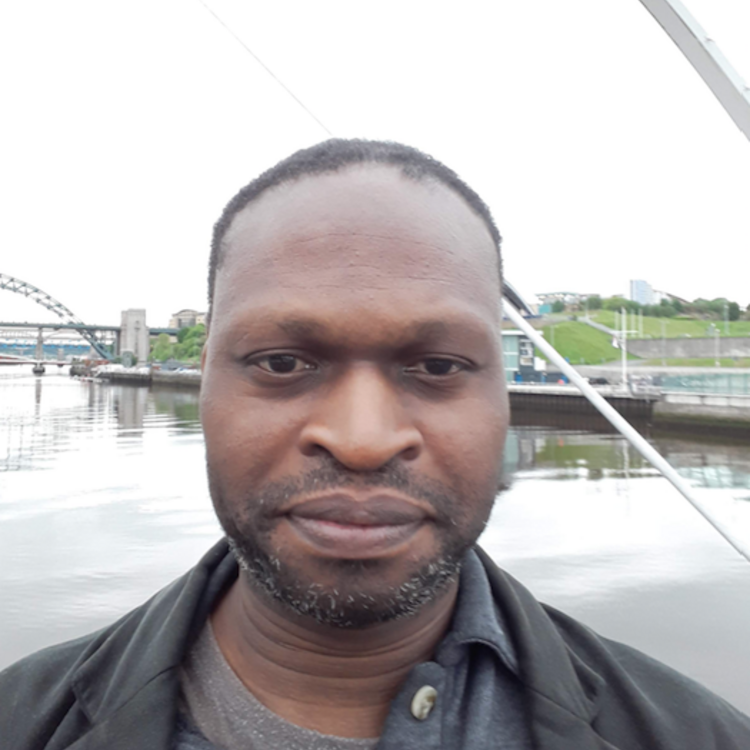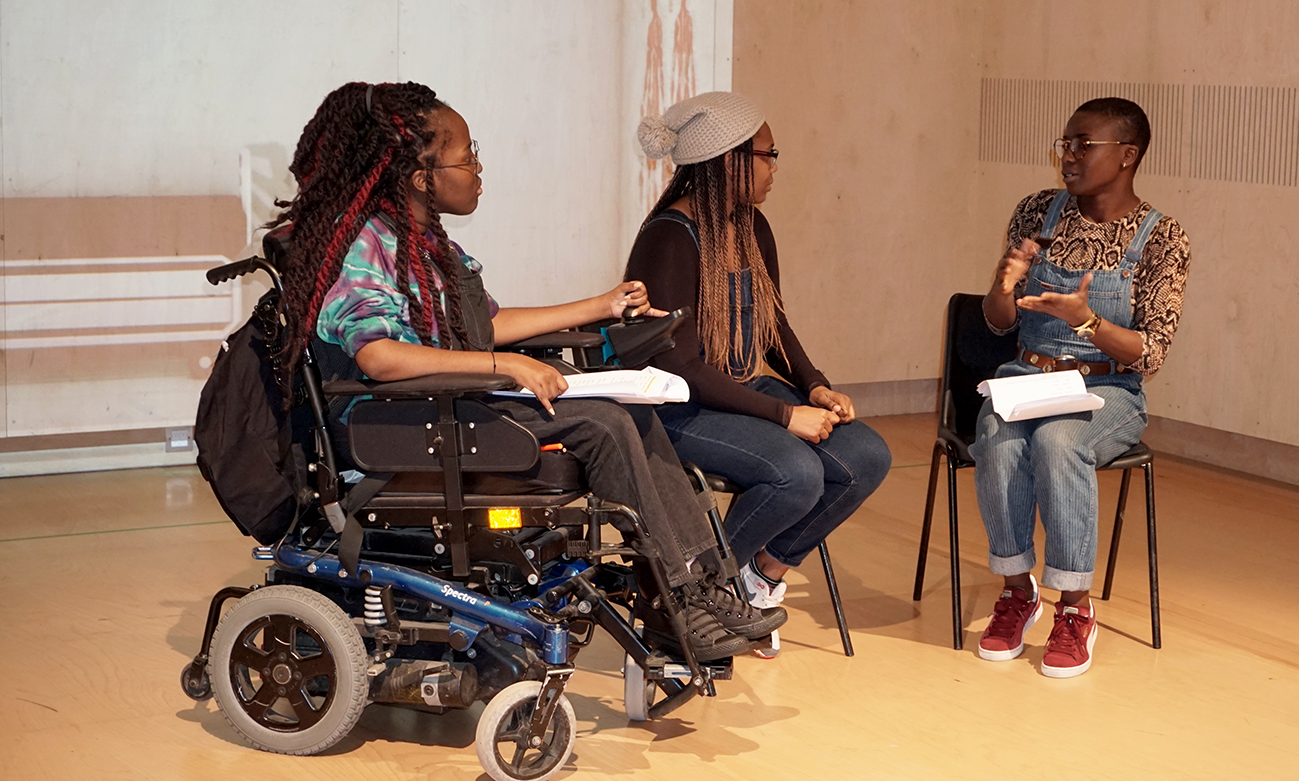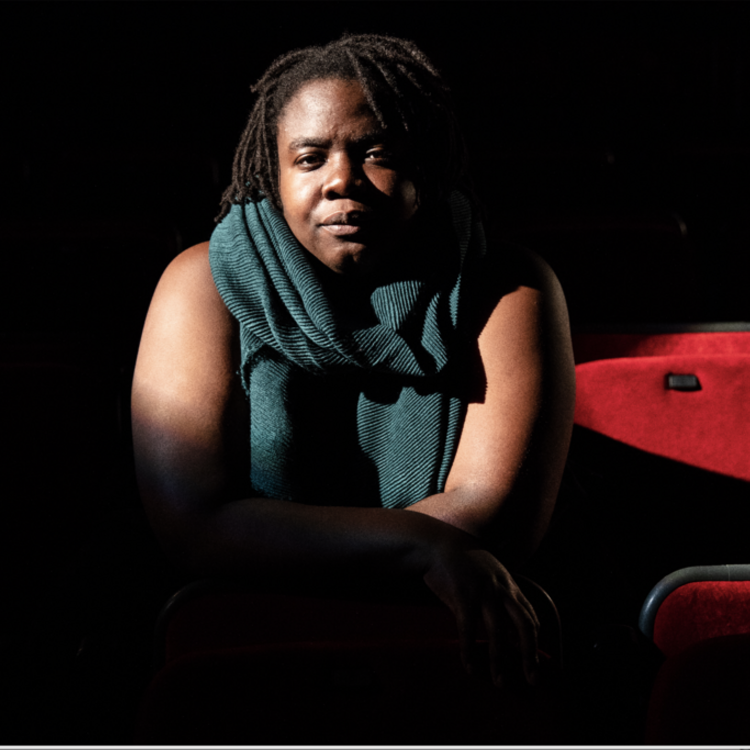Dipo: “Go and study law. Go and read law. You want to sit down at home? What are you writing?” My mom couldn’t believe it. “Go to university to study theatre? Are you kidding me? What a waste.” When I left university, I worked in an art gallery. At the time, theatre as a profession was dying out because of the economic situation in Nigeria. It was terrible. And that’s when loads of people started leaving the country. It wasn’t just theatre artists. Everybody who could leave was leaving.
And I thought, Well, I’ve got a British passport. So I left. When I came back to the UK, it was moving towards New Labour, Tony Blair. And the Blair government gave extra money to theatres—with a caveat that it had to be used towards diversity. I remember looking at people saying to me, “Oh, you say you’re a writer. It’s your turn now. All you Blacks and Asians, it’s your turn.”
At that time, people took it. It was really interesting, the mentality. It wasn’t a case of, “Wow, there are talented Black and Asian writers who have stories to tell, who can be part of the national conversation.” It didn’t have to do with the quality of the work, or the fact that there had been Black plays previously—Michael Abbensetts, Mustapha Matura, and Winsome Pinnock had all been writing long before this period. It was very much, “It’s your turn.”
It still took me three years to get my first play on, because at the time people were more interested in Caribbean voices than African voices. But I just knew it had to happen: I would get my play on by hook or by crook. We were applying to everybody, writing to theatres, it was almost a case of writing, “Hello, dear theatre, have you found your Black writer yet?” In the end, we put the play on ourselves, because nobody would do it.
When I discovered the term [Afrofuturism], it redefined all the work I wanted to make. I felt like my work now belonged to a canon.
Matilda: I didn’t get into theatre or understand theatre until during GCSE Drama when we went to go see Roy Williams’s Joe Guy. That was the first non-pantomime theatre I’d seen, a show that wasn’t brought to the school. It blew me away, because it was funny, it was relatable, and it was also really challenging.
I didn’t know anyone could be a writer, let alone me, until I was about seventeen years old. When applying to university I applied for psychology, and I changed it last minute behind my mum’s back. I thought if I started the course, she couldn’t stop me.
I did creative writing and English literature, which opened up my eyes. While at university I joined Soho Theatre’s Writers’ Lab. I was incredibly nervous—in my first year of joining the group, my attendance was bad because I developed really bad anxiety knowing that I had to write something in advance and share work. In the second year I had better attendance. And I kept doing it every year I was at university, which you couldn’t do now because there are so few places, and those that exist are much more in demand.
To be able to get three years of proper discipline and training, being forced to write a new play every year, regardless of if it was good or bad… That was an achievable goal, and I have tried to keep that up. It took me four years to get my first play on. We had to do several crowdfunding pages and all sorts of applications to Arts Council England to get grants and funds for research and development. It was really eye-opening going from writing plays every year to, “How do you get it on? We have no money, and no one we know has money.”
Dipo: Somebody who has a much more privileged background can call on their influence, their network, to help.
Matilda: I’m not always the biggest fan of crowdfunders, because sometimes it’s asking friends and family to donate when you already know their financial situation. I feel such guilt. Why don’t I have a rich uncle who has an account in the Cayman Islands or runs his own multimillion-pound business or something?
Our social circles are usually made up of people at the same level as us in terms of experience and financial circumstance. There’s a clear difference in terms of how people from our experiences seek out and rally support, whereas someone who doesn’t need to has less networking to do. They get to focus on the art, while we’re all focusing on how to fund the thing. Those kind of barriers definitely slow down careers, sometimes dangerously to the point where people just walk away. For a lot of people that makes sense. “Why am I going to do this for another ten years if I still can’t afford to pay my rent or put food on the table?” Especially for artists with families, or disabled artists.
Dipo: As a freelancer in the arts, the work is very piecemeal. You get a commission, and with commission monies you’d need at least four a year to live. And it’s very difficult to write four plays.
Matilda: Sometimes I can barely write one in a year, let alone four.
Dipo: And you’re not the only writer. If you’re famous then yes, venues sometimes want to commission you. But even then, the back ends can be negligible. If you put on a play in a hundred-seat theatre, you’re not going to expect to be rolling in money from your cut of the box office or royalties. As artists we have to educate ourselves and others about the finances of theatre.
Matilda: That education has to come into the teaching of playwriting. That side is so neglected. The majority of working playwrights also have full-time or part-time jobs, or may have partners who are able to help supplement their income. I’ll do the odd storytelling workshop for beginners interested in playwriting, especially for disabled people—as a disabled artist I know there are so few accessible playwriting courses. I’ll script read and write script reports. I recently did a sensitivity reading for a screenplay.
Because of the nature of my disability, I am unable to hold down a part-time job in anything, because the world is so bloody inaccessible. But I can do all those things from my computer. Odd jobs to be able to supplement the fact that playwriting just doesn’t pay enough. The lack of a stable income is so dangerous that you have to be doing something else to be able to get by.
For us, the question is: What are the repercussions if we have a stinker? Is it that the phone stops ringing?
Dipo: Writers can apply for or be offered fellowships and residencies, but it’s only maybe film and TV money that will earn them a living from scriptwriting. A play on its own is not going to suffice—even very good plays have short lifespans. They have a first run, and they’re lucky if they get a second.
There is also a sense that Black stories don’t travel, which puts us at a disadvantage. There are some exceptions to the rule: Natasha Gordon’s Nine Night, which transferred from the National Theatre to the West End, Arinzé Kene’s Misty, which transferred from the Bush Theatre to Trafalgar Studios, the several revivals of Inua Ellams’ Barber Shop Chronicles.
In 2003, Roy Williams had Fallout at the Royal Court. At the same time, Kwame Kwei-Armah had Elmina’s Kitchen at the National Theatre. That was a watershed moment. Two major Black writers, Black British writers, co-opted two stages in the two biggest theatres.
I do see some kind of changes going on now, especially with what’s going down in the regions. Black writers in the regions—there’s even less of a voice. But some venues, such as Contact Theatre in Manchester, are very much focused on developing young artists. They are training and running workshops for poets, and trying to upskill them too, and the poetry scene is so diverse! So then you have shows like Misty. You have Debris Stevenson who wrote Poet in da Corner, which was on at the Royal Court.
These artists are challenging the forms in which stories are told. That brings me to your take on Afrofuturism. What is that like?
Matilda: I first discovered the term when I really got into Janelle Monáe’s music and music videos. They were like films, and she called them emotion pictures. I remember reading an article and they described her “Afrofuturist videos” or “Afrofuturist aesthetic.” I looked it up, and I was like, “Wow.” I think I’ve always dreamt in Afrofuturism and didn’t realize.
The idea of centering Blackness but projecting it into the future, and what that looks like, could be anything about our historical African religion, mixed with science fiction and fantasy. Those themes already fit nicely with African cosmology, because most of it, from a Western viewpoint, looks very fantastical, even though from an African viewpoint it is religion, it is culture, it is the way we exist and operate in the world.
When I discovered the term, it redefined all the work I wanted to make. I felt like my work now belonged to a canon. In the past I’d gotten criticism about some of the stories I wanted to tell. like, “How would anyone believe this? What is this?” And I wouldn’t be able to articulate what it was. Now I can say it’s Afrofuturism. I utilize Nigerian folktales, and cosmology and religion, and mix it with a bit of Western science fiction and fantasy, because that’s where I exist. I’ve found it so refreshing.
This leads nicely onto the future of Black writers in the UK. I don’t know if other writers feel this, but I definitely feel a lot of pressure that my work can’t be mediocre. There are so few opportunities for us, it’s like we have to be not just excellent but extraordinary. The play cannot just be in a fringe theatre. It has to transfer and keep transferring, and become a radio play, and a film. I feel this pressure that I cannot just test work out. It’s got to be incredible, otherwise all the doors close.
Dipo: We have to work twice as hard. There’s a truth to that.
After my first play went on, I started getting commissions. But what I realized very quickly was that a lot of them were from Black theatre companies, not mainstream ones. The process was easier because I was building relationships everywhere I went. If I turned in a terrible draft, which I was always doing, they’d be patient. They’d say, “Okay, let’s go back to the drawing board, let’s talk about it.” It’s not so much about excellence. Sometimes there’s a specific play they’re looking for. And when they don’t get it, that’s where the problem is.
I started off writing satires and comedies. Any time I wanted to write a different kind of play, the eyes of the literary manager or artistic director would glaze over. I’d lose them. “Why don’t you just write another satire, Dipo, that’s what we want.” That didn’t help me, because I wanted to expand as a writer. I wanted to write different things. I saw myself as a theatre person, not as a satirist.
When your white counterparts make a similar mess with a play, they’re not told off. They’re not reprimanded. All you need to do is to read a review in any of the newspapers to know that everybody, whether they’re Black or white, writes a stinker. And the critics will say it. For us, the question is: What are the repercussions if we have a stinker? Is it that the phone stops ringing?
Pat Cumper, the playwright, always used to say that we shouldn’t be fighting for the right to be excellent, we should be fighting for the right to fail. A lot of white writers write stuff that doesn’t do well, and three months later they’re opening a new show.
I think for us as Black writers there’s this churn where we write one or two plays and then all of a sudden we’re stuck in a limbo. What’s the upward trajectory? If this were a management job, I’d move from maybe floor work, to supervisor, to manager. For a writer, is it moving from a smaller venue to a bigger venue? We as writers have to try to better understand the way things work.
When you are disabled, people treat you as less than, as worthless. But writing and Afrofuturism remind me I am something. I am someone. I am here. I exist.
Matilda: Having a disability throws a spanner into the works. When I had my first play on, we were lucky enough for it to go on a small tour of the UK to a couple venues. Afterwards, no one came knocking at the door. I didn’t get my first theatre commission for a full-length play till this year, five years later. During that gap I wondered, Were the plays I had written in that time never up to standard? Which definitely wasn’t the case. I know now that I’m a very good writer. I just wasn’t given the opportunities or the resources to develop to become an even better writer than the person who wrote that play five years ago.
In that time, I wrote almost twenty short plays. I got to meet incredible directors who were on their way to having great careers, people I definitely wanted to collaborate with again. Actors too. But that five-year gap was torturous. You can’t make a living off writing short plays—more than half of those nights were unpaid. But no one, until Lynette Linton at the Bush Theatre, took a chance on me, said “Okay Matilda, you’ve written a lot of short plays and not given up since you wrote your first full-length one five years ago. How about I give you a commission and see what you produce?”
The most money I’ve made is from screen opportunities. It was just people believing that I could tell a story and that I had interesting stories to tell because of the way I exist in the world as a Black disabled woman.
I have very different experiences from my siblings who do not have disabilities. Yes, the racism crosses over, but when you are disabled, people treat you as less than, as worthless. But writing and Afrofuturism remind me I am something. I am someone. I am here. I exist. And I’m not going anywhere.
Disabled people are not new. They’re not a trend. They’ve been here since the dawn of time. The reason why we still exist and keep existing in all variations is because we survive. We are inherent survivors. I haven’t seen that on stage, or rarely do see that on stage. Because society’s still not ready to address its issue with disabled people.
Disability is not static. Having a condition doesn’t mean it will be like that for the rest of your life. I’ve had a tumultuous time with my health of late, and that’s evidently going to be part of my career: sometimes my health is great, and other times it isn’t. Just like if someone has the flu or is in hospital, how do you expect them to complete a play when all they should be thinking about is resting or getting better?
I find this intersection of being disabled and Black sometimes really messy. But I would not change it for the world because of the way I’ve experienced the world. The stories that appeared to me as a result—I would have not have discovered them if I wasn’t who I am.
Dipo: You’re right. We haven’t heard stories like yours. Not even on the main spaces where national debates should take place. The question is: Is theatre doing enough to accommodate writers like you? And by accommodate I don’t mean tolerate. Theatre is a place, it’s a public forum, it’s a public building. It should be open to all and accessible to all. Not just in terms of audience, but in terms of what plays out on stage.
Talking about race alone, there are still a number of venues in London that never put on a play by a Black British writer. When the writer is Black, they’re African American. British stories seem to not have the same currency. More so stories like yours. I’ve always been angry about the fact that a lot of the times the main stages are being co-opted by African American plays. And it’s not to do with the fact that those plays aren’t good. I love those plays and it’s been a privilege to watch them. But it shouldn’t be at the cost of Black British voices. The up-and-coming African American writers aren’t better than their equivalents here. The African relationship in the world is triangular. It’s the Americas, the Caribbean, and Africa. A lot of time, even with all my experience, I go into theatres and still feel alienated. I do the headcount.
Matilda: It’s always like, “Where are the Black faces? How many—one, two, three? Is it three? Oh no, they were just wearing a hat, it’s two of us.” I’m also usually the only person in a wheelchair or with a visible condition.
Dipo: When I’m at the National and I talk with Black or Asian writers there, it’s the same concern. Once we get together, we talk. We say we’re happy to be in these spaces.
Matilda: Those conversations are important, because when they land in the right ears, hopefully something will change. It’s when we stay silent that nothing changes.
Dipo: I think it’s a tribute to the Black British spirit because one of the reasons why we are more visible in theatre than other minority groups is that we have been the most vocal about things when they don’t sit right with us. We complain, we shout, we scream. It doesn’t matter whether it feels irrational to anybody. As far as we’re concerned, we are working in an irrational environment. And if you’re in an irrational situation, you must speak up.
Matilda: You must kick up a fuss.
Dipo: Doesn’t matter what anybody thinks of you. It’s about opening the door and making sure that it never closes.





Comments
The article is just the start of the conversation—we want to know what you think about this subject, too! HowlRound is a space for knowledge-sharing, and we welcome spirited, thoughtful, and on-topic dialogue. Find our full comments policy here